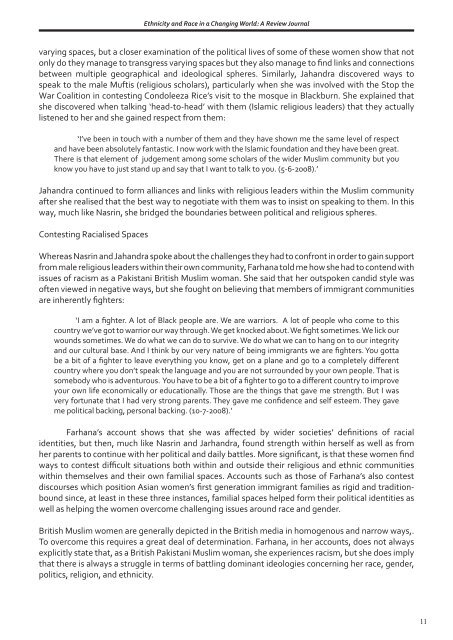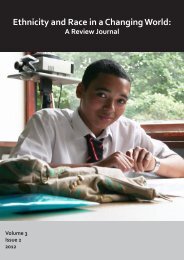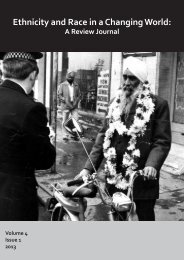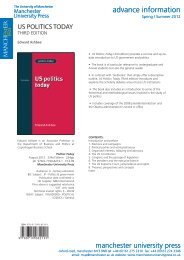Ethnicity and Race in a Changing World
Volume 2, Issue 1, 2010 - Manchester University Press
Volume 2, Issue 1, 2010 - Manchester University Press
- No tags were found...
Create successful ePaper yourself
Turn your PDF publications into a flip-book with our unique Google optimized e-Paper software.
<strong>Ethnicity</strong> <strong>and</strong> <strong>Race</strong> <strong>in</strong> a Chang<strong>in</strong>g <strong>World</strong>: A Review Journalvary<strong>in</strong>g spaces, but a closer exam<strong>in</strong>ation of the political lives of some of these women show that notonly do they manage to transgress vary<strong>in</strong>g spaces but they also manage to f<strong>in</strong>d l<strong>in</strong>ks <strong>and</strong> connectionsbetween multiple geographical <strong>and</strong> ideological spheres. Similarly, Jah<strong>and</strong>ra discovered ways tospeak to the male Muftis (religious scholars), particularly when she was <strong>in</strong>volved with the Stop theWar Coalition <strong>in</strong> contest<strong>in</strong>g Condoleeza Rice’s visit to the mosque <strong>in</strong> Blackburn. She expla<strong>in</strong>ed thatshe discovered when talk<strong>in</strong>g ‘head-to-head’ with them (Islamic religious leaders) that they actuallylistened to her <strong>and</strong> she ga<strong>in</strong>ed respect from them:‘I’ve been <strong>in</strong> touch with a number of them <strong>and</strong> they have shown me the same level of respect<strong>and</strong> have been absolutely fantastic. I now work with the Islamic foundation <strong>and</strong> they have been great.There is that element of judgement among some scholars of the wider Muslim community but youknow you have to just st<strong>and</strong> up <strong>and</strong> say that I want to talk to you. (5-6-2008).’Jah<strong>and</strong>ra cont<strong>in</strong>ued to form alliances <strong>and</strong> l<strong>in</strong>ks with religious leaders with<strong>in</strong> the Muslim communityafter she realised that the best way to negotiate with them was to <strong>in</strong>sist on speak<strong>in</strong>g to them. In thisway, much like Nasr<strong>in</strong>, she bridged the boundaries between political <strong>and</strong> religious spheres.Contest<strong>in</strong>g Racialised SpacesWhereas Nasr<strong>in</strong> <strong>and</strong> Jah<strong>and</strong>ra spoke about the challenges they had to confront <strong>in</strong> order to ga<strong>in</strong> supportfrom male religious leaders with<strong>in</strong> their own community, Farhana told me how she had to contend withissues of racism as a Pakistani British Muslim woman. She said that her outspoken c<strong>and</strong>id style wasoften viewed <strong>in</strong> negative ways, but she fought on believ<strong>in</strong>g that members of immigrant communitiesare <strong>in</strong>herently fighters:‘I am a fighter. A lot of Black people are. We are warriors. A lot of people who come to thiscountry we’ve got to warrior our way through. We get knocked about. We fight sometimes. We lick ourwounds sometimes. We do what we can do to survive. We do what we can to hang on to our <strong>in</strong>tegrity<strong>and</strong> our cultural base. And I th<strong>in</strong>k by our very nature of be<strong>in</strong>g immigrants we are fighters. You gottabe a bit of a fighter to leave everyth<strong>in</strong>g you know, get on a plane <strong>and</strong> go to a completely differentcountry where you don’t speak the language <strong>and</strong> you are not surrounded by your own people. That issomebody who is adventurous. You have to be a bit of a fighter to go to a different country to improveyour own life economically or educationally. Those are the th<strong>in</strong>gs that gave me strength. But I wasvery fortunate that I had very strong parents. They gave me confidence <strong>and</strong> self esteem. They gaveme political back<strong>in</strong>g, personal back<strong>in</strong>g. (10-7-2008).’Farhana’s account shows that she was affected by wider societies’ def<strong>in</strong>itions of racialidentities, but then, much like Nasr<strong>in</strong> <strong>and</strong> Jarh<strong>and</strong>ra, found strength with<strong>in</strong> herself as well as fromher parents to cont<strong>in</strong>ue with her political <strong>and</strong> daily battles. More significant, is that these women f<strong>in</strong>dways to contest difficult situations both with<strong>in</strong> <strong>and</strong> outside their religious <strong>and</strong> ethnic communitieswith<strong>in</strong> themselves <strong>and</strong> their own familial spaces. Accounts such as those of Farhana’s also contestdiscourses which position Asian women’s first generation immigrant families as rigid <strong>and</strong> traditionbounds<strong>in</strong>ce, at least <strong>in</strong> these three <strong>in</strong>stances, familial spaces helped form their political identities aswell as help<strong>in</strong>g the women overcome challeng<strong>in</strong>g issues around race <strong>and</strong> gender.British Muslim women are generally depicted <strong>in</strong> the British media <strong>in</strong> homogenous <strong>and</strong> narrow ways,.To overcome this requires a great deal of determ<strong>in</strong>ation. Farhana, <strong>in</strong> her accounts, does not alwaysexplicitly state that, as a British Pakistani Muslim woman, she experiences racism, but she does implythat there is always a struggle <strong>in</strong> terms of battl<strong>in</strong>g dom<strong>in</strong>ant ideologies concern<strong>in</strong>g her race, gender,politics, religion, <strong>and</strong> ethnicity.11






